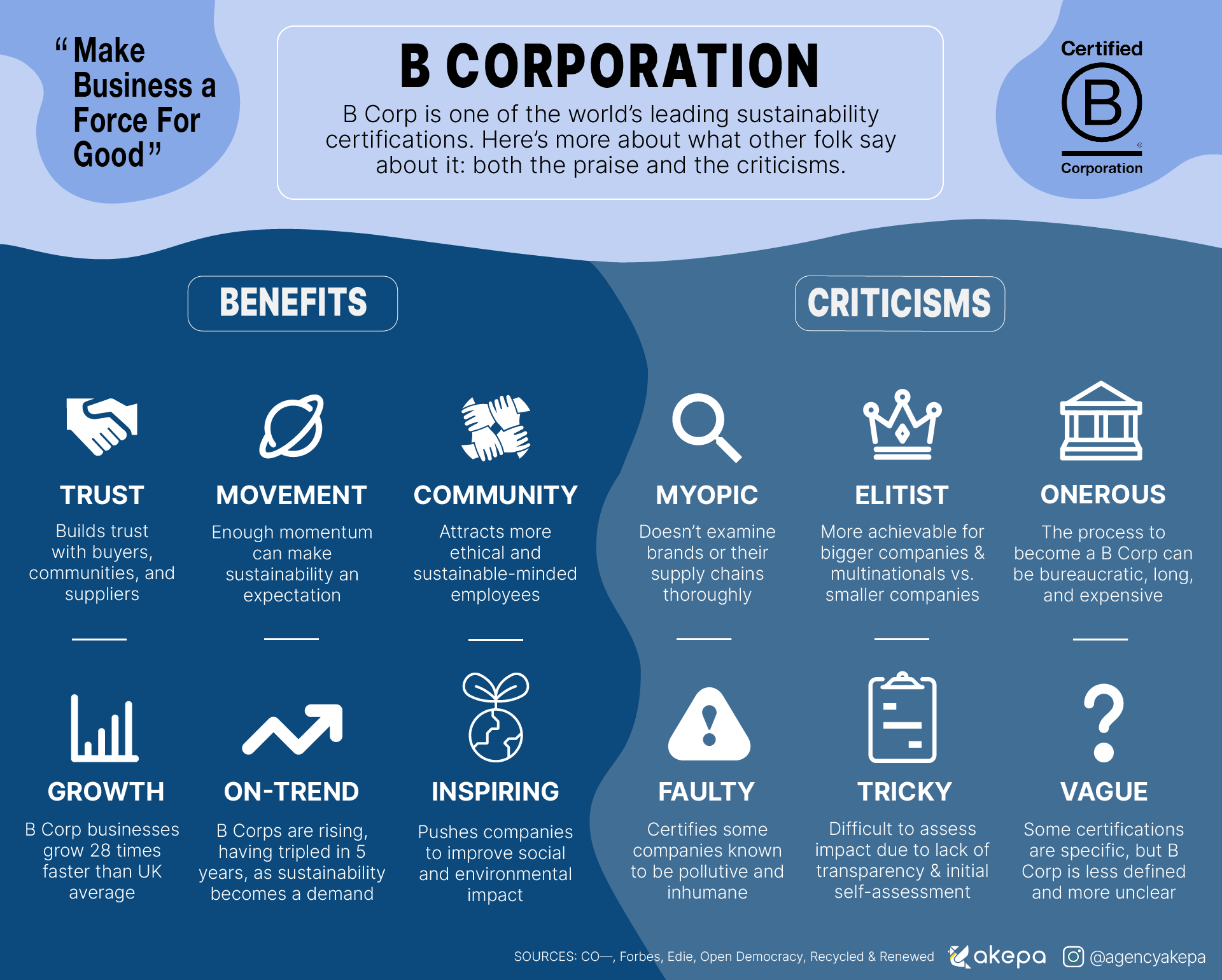Buying nectar low, selling honey high, getting all your mindless drones to do all the work while you buzz around wearing a tiny little necktie? That’s a bee corporation and, while very sustainable, it’s a very crowded market and usually requires you to be a bee. So if you’re a human reading this, you’re out of luck.
However, a better option for humans in business is to consider becoming B Corp certified.
What is a B Corp?
Think of a B Corp as being to business what Fair Trade is to bananas. It’s a public commitment to “meet the highest standards of verified social and environmental performance, public transparency, and legal accountability to balance profit and purpose.”
It’s saying to the public ‘we’re trying to be better, to reduce harm across the environment, society, and in business and we’ve got the certificate to prove it’. It’s about shifting the focus away from profit and towards purpose.
Unlike some other initiatives, there’s an independent body that assesses whether a business meets the right criteria to make that claim. B Lab is a not-for-profit organisation that awards B Corp status to for-profit businesses and it doesn’t seem to give it out too hastily.
There are brands that you would expect to be B Corp certified like Patagonia but also brands that are less obviously connected to the world of sustainability like The Guardian Media Group and Ben & Jerry’s.
Note that B Corp is different from Benefit Corporation.
Why be B Corped?
Why bother? Of course, you can be a sustainable business without being B Corp certified but in a world where “…the majority of Generation Z (54 percent) state that they are willing to spend an incremental 10 percent or more on sustainable products, with 50 percent of Millennials saying the same” a certification means that your customers don’t have to just take you at your word. It gives them the peace of mind that your business is legitimately doing something to make the world a bit better.
And aside from the potential commercial and marketing benefits, it can create a movement. If enough businesses get certified it can become an expectation. In time, it may start to look like a big mark against a business if they’re not certified, which may raise questions about why they’ve not yet been accredited. If it means that they have to change their working practices, then all the better.
It can also attract the right kind of talent to your business. More and more graduates are ethically minded, wanting to work for organisation who are doing good, so having the B Corp seal of approval can be a big tick for new recruits.
Are there alternatives?
Yes and no. You can follow these tips and choose from an array of other certifications to confirm your commitment to an aspect of sustainability or decide to use other ways to meet the same B Corp goals. We decided to address our corporate emissions and that’s accredited by ClimatePartner. Still, these approaches differ a bit from becoming a B Corp, which is about the balancing of profit and purpose overall. It’s not just about one element and it’s not just about climate change. In a way, it’s more about ethics.
How do I get accredited?
There are a few steps to go through to become B Corp certified.
First, you’ve got to qualify as the right kind of business. B Lab ask that you generate the majority of your revenue from trading and compete in a competitive marketplace. They don’t generally allow registered charities or public bodies to apply but apparently do take each registration on a case-by-case basis.
If you qualify, you need to take an online assessment. This is a long questionnaire that asks about 7 key impact areas*:
- Purpose & Stakholder Governance
- Fair Work
- Justice, Equity, Diversity & Inclusion
- Human Rights
- Climate Action
- Environmental Stewardship & Circularity
- Government Affairs & Collective Action
You must meet minimum performance requirements across each area. Do that, and you’re onto the next step – certification. This is where a B Lab staffer will meet with you virtually to go through your answers, ask further questions and confidentially review documentation that can back up your claims.
And finally, you’ve got to pay. There is an initial verification fee and then an annual certification fee. B Lab runs a sliding scale of fees depending on the size of your business. However, even at the lowest tiers the overall fees run to several thousand dollars per year (or pounds / euros etc.). It’s fairly expensive.
And crucially, certification only lasts three years, after which you’ll need to go through the process again to prove that you’re keeping up the good work. As of June 2024, all updated paperwork needs to be submitted six months before the recertification date.
* New standards are being rolled-out in 2025 and these are the new impact areas, which have been amended and increased from 5. The requirement of an overall score of 80 is also being changed to a performance-based system.
Are there downsides?
Not especially. Make sure that you give serious consideration to your motivations before applying. Becoming B Corp certified needs to be more than a PR move. Only one in three companies that submit for certification will actually certify. Is your business ready to have a shift in mindset away from profit and towards the benefit that you business can provide?
Due to the focus on purpose over profit, a B Corp certificate could also put off certain investors. If you’re having to make supply chain decisions that prioritise ethics over cost, that could have implications for those who’re keen on investing, so keep in mind who you’re targeting as a potential partner.
Are there criticisms of B Corp certification?
Yes. B Corp certification isn’t immune to criticism. There’s also an argument that becoming a B Corp shouldn’t be necessary. Like any certification, B Corp status isn’t perfect and the process is also continuously improving based on criticism.
Since we first wrote this post we’ve had a bit more interest in some of the criticisms. Here’s a quick synthesis of what other people are saying online. Bear in mind this needs to be balanced by all the positive points about B Corp, too.
Criticisms of B Corp certification – summary:
- Greenwashing: Some companies that are B Corped seem a bit questionable. Innocent Drinks is a B Corp but the company uses a fair amount of single-use plastic and is owned by Coca Cola, the worst plastic polluter in the world. Innocent has also had adverts banned for greenwashing. More recently, Evian, a company that sells water in plastic bottles has just become a B Corp. Then, Nespresso – a subsidiary of Nestle that makes single-use coffee capsules – became a B Corp. That’s more than a little alarming.
- Short-sighted: When you consider examples like the above, it’s unclear how thoroughly B Corp examines supply chains as an extension of the company itself. This is one of the main reasons that Dr Bonner’s – the top scoring B Corp to date – has just relinquished the certification, citing disappointment at this oversight, “most glaringly in the case of large multinational companies and their enormous supply chains”. In our milieu, there are certified marketing agencies that partner with fossil fuel clients.
- Onerous: The process to becoming a B Corp is said to be long drawn-out and bureaucratic – with support from B Lab that isn’t the best if you’re a smaller company. There have been complaints that the process to get certified is complex, frustrating, and can take up to 10 months or more.
- Vague: There are a lot of certifications out there that are specific, for instance The Climate Label, which is focused on reducing corporate GHG emissions. B Corp is more holistic. This can be a strength but it could also be seen as a weakness. There’s a bit of nebulousness about what the certification means – especially when it comes to environmental impacts.
- Expensive: B Lab is a nonprofit company but some folk complain about the expense vs. the value for money. The costs can mount up – even at the lower end of the tiered pricing model.
- Legally unclear: B Lab is not liable if a certified company fails to meet the standards required. Changes in company bylaws can also be made without transparency.
- Self-assessment: Certification is initially self-assessed, so some people feel there’s a bit of a lack of accountability.
- Complacency: Once the hallowed B Corp insignia has been attained, and displayed, a company could be more inclined to leave it there and not do anything else. But there’s always more to do to be sustainable and environmentally friendly.
- Restrictive: The legal commitments of being a B Corp can be limiting. If you’re a small sustainable company, this may inhibit your ability to grow and make all the moves you want to. Viewed in that light, this could mean suppressing sustainability vs. supporting it.
- Elitist: Based on all of the above, B Corp certification may be more manageable for established companies and multinationals vs. the startups that are challenging the system, which arguably defeats the whole purpose. You could say there’s a bit too much ‘corp’ in B Corp certification.
Here’s a graphic of the benefits & criticisms:

2025 tightening of standards:
Because of all of the criticism, from some pretty high-profile places and brands, B Lab has tightened its standards in April 2025. By doing so, it aims to make B Corp certification more rigorous and respected again; less open to accusations of greenwashing. Without these improvements it doesn’t take a seer to look into the future and see visions of more brands taking the lead of Dr Bronner’s – and navigating other routes to demonstrating sustainability.
Here’s a quick summary of the new B Corp standards introduced in April 2025:
- To open the gate to the certification process, there are now ‘Foundation’ requirements.
- There are now 7 revised Impact areas – up from 5.
- Companies must meet minimum requirements within each area.
- Previously just an overall score was needed – now the certification is performance based.
- Continuous improvement must be shown. Beforehand it was just encouraged.
- All certifications must now be verified by a third-party.
- To facilitate the move to the new standards, ‘Large Enterprise’ and MNC applications are on hold.
Do these changes go far enough? Some say yes, others say no, but we think the certification will be a lot tighter.
So is Akepa a B Corp?
Put plainly, no. We’ve focused on other certifications and ways to be sustainable. To be honest, it’s too much for us to display a label that’s also carried by pollutive and unethical multinationals, like Nestle. Never mind all the expense and time to achieve something that’s tainted, in our view. But we’re always considering new ways to confirm our commitment to sustainability and may look at it in the future. We could also choose a path that’s a touch more focused on the planet, given how pressing we feel that side is.
We’re also aware that B Corp certification is continuously improving and may reconsider further down the line.
For now, though, we’re pretty happy with being ClimatePartner certified and our other sustainability initiatives. After all, there are many ways to be a sustainable company and B Corp certification just one of those ways.
Have you been involved in applying to become a B Corp, or have you worked for a certified company? What was your experience like? Let us know in the comments. And if you’re a sustainable company that’s looking to work with a like-minded sustainable marketing agency then get in touch and we can have a chat about your plans.



We are a very small business who are passionate about all things sustainable. The process to become certified as a B Corp company has been exceeding complex and frustrating. Unless you have a background in understanding the jargon and opaque requirements, it is confusing to understand exactly what is required. We have finally reached a position where all the documents and legal requirements have been submitted (and the time taken to pull all together could have been better used within the business!) and according to the status page…the reviews are pending. Its been 4 months. Instead we receive emails for modules that need to be paid for. It certainly seems and feels like the B Lab are exploiting us – we have had zero income due to the pandemic and obviously are not deemed important enough. It appears B Lab need tp practice what they preach. They have not be responsive except when they seek participants for modules that require payment.
Thanks Yvette – that’s interesting feedback and could be useful for an update to the post that we’re planning to do over the next few months that includes a bit more detail on some of the drawbacks. In any case, we’ve decided to pursue other ways of accrediting the business that are a bit more specific and will be looking at the options over the next few months. Would you mind letting me know what company you work for, out of interest? You can also email me directly if it’s better.
Thanks for this input here Yvette. It certainly sheds light on some downsides to B Corp certification that can be used as criticisms from small businesses. Almost in way that suggests that B-Corp undermines the impact of small businesses with all the barriers. For the record I am also fan of all things environmentally sustainable. It’s the future 😁